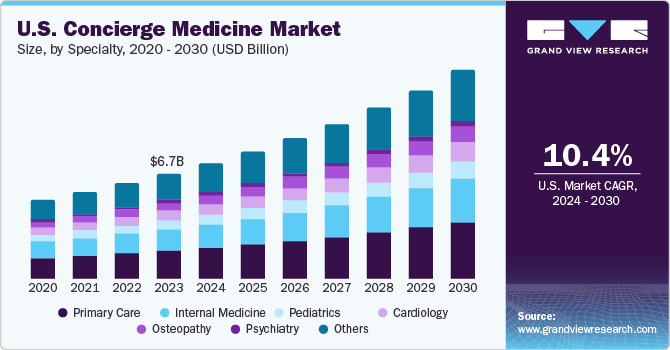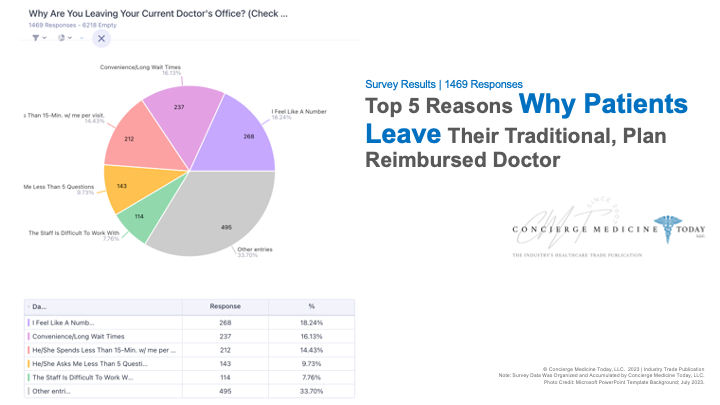This post was co-authored with Dr. Daniel Carlin, MD, Founder and CEO or WorldClinic.
In a medical system often strained with long wait times and hurried appointments, a growing number of patients are seeking a different kind of healthcare experience. Concierge medicine offers a more in-depth, personalized solution, promising greater access to doctors and a focus on overall wellness. This model is experiencing significant growth, with the U.S. concierge medicine market estimated at USD 6.7 billion in 2023 and projected to reach USD 15.1 billion by 2032, indicating a CAGR of 9.3%. This increase suggests a growing recognition of the value inherent in concierge healthcare’s patient-centric focus and concierge medicine trends.
But what is concierge medicine exactly?
In this blog, we’ll cover what it is, how the model works, how healthcare differs in concierge medicine Vs direct primary care, the potential benefits, and key considerations. Finally, we’ll explore how WorldClinic offers a distinctive and globally-minded approach to concierge medicine.
What is Concierge Medicine?
Concierge medicine, sometimes called membership-based or retainer-based medicine, provides a premium level of healthcare. At its core, its hallmarks include:
- Enhanced Accessibility: Unlike traditional practices with limited hours, concierge medicine grants you direct access to your physician beyond standard office hours. This extended accessibility allows you to reach your concierge doctor via phone, email, or even text message for urgent questions or concerns.
- Personalized Care Model: Concierge practices prioritize building strong, enduring relationships with their patients. This is achieved by deliberately limiting the number of patients per doctor. This structure allows for in-depth consultations, a focus on preventive care tailored to your individual needs, and the ability to develop a proactive approach to managing your health.
- Reduced Wait Times: It eliminates the frustration of lengthy waiting rooms, a common grievance in traditional healthcare settings. Appointments are prioritized, ensuring you’re seen by your doctor promptly and efficiently. Additionally, concierge practices often schedule more time per appointment, allowing for a more thorough discussion of your health concerns and a collaborative approach to creating a personalized care plan.

How does Concierge Medicine work?
The basis of concierge medicine is typically an annual or monthly membership fee. This fee grants you access to the enhanced services and extended availability offered by the practice.
Concierge medicine practices also prioritize flexibility and efficiency in scheduling. You’ll often be able to secure same-day or next-day appointments for timely medical attention. Appointments also generally have a longer time allocation for in-depth conversations about your health history, current concerns, and lifestyle factors.
WorldClinic expands upon the concierge model by incorporating:
- Concierge Telemedicine: We offer virtual consultations with our doctors, adding flexibility and convenience – especially for frequent travelers or those with busy schedules. No matter your location, you can connect with your WorldClinic physician for follow-ups, prescription refills, or addressing health questions.
- PMKs (Prescription Medical Kits): We give you peace of mind with our personal PMKs (Prescription Medical Kits). These exclusive, members-only kits are tailored to your specific needs and contain essential medications and medical supplies. This ensures access to healthcare essentials while traveling, maintaining consistency in your care plan.
Concierge Medicine vs. Direct Primary Care
While both concierge medicine and direct primary care (DPC) prioritize enhanced access to your doctor and a focus on personalized care, there are essential differences to consider when deciding between the two models.
- Cost Structure and Membership Fees: Concierge practices often carry higher membership fees than DPC models. This reflects the potential for wider-ranging services within concierge practices.
- Scope of Services: Concierge medicine frequently offers a broader array of services compared to DPC. These additional services can include comprehensive annual physical exams, in-house diagnostics, coordination with specialists, and even house calls in specific cases. DPC practices tend to focus on core primary care needs.
- Insurance Approach: Unlike DPC practices, which generally operate completely outside of traditional insurance billing, some concierge practices may accept insurance for specific services in addition to membership fees. This hybrid model can potentially streamline certain aspects of care.
Pros and Cons of Concierge Medicine
Pros
The benefits of concierge medicine are many:
- Exceptional Doctor Access: Concierge physicians are available beyond standard office hours, often via phone, email, or even text, providing more immediate and direct communication. With more doctors going to concierge medicine, accessibility is on the rise.
- Personalized Care Plans: With longer appointment times, your doctor can thoroughly understand your health history, lifestyle, and concerns. This enables them to create a care plan tailored to your specific needs and goals.
- Proactive and Preventive Focus: Concierge care emphasizes preventive strategies and proactive monitoring to optimize well-being and potentially reduce the risk of future health complications.
- Efficient Scheduling and Reduced Wait Times: Appointments are generally easier to secure, often within the same or next day – or immediately in the case of WorldClinic’s model.
- Expert Care Coordination: Concierge doctors often assist with specialist referrals, complex care scenarios, or navigating the broader healthcare system.
Cons
Despite the undeniable advantages, there are some problems with concierge medicine:
- Higher Overall Costs: Membership fees add to existing insurance premiums, making concierge medicine more expensive than traditional models.
- Insurance May Still Be Necessary: While some concierge practices integrate with insurance, you may still require coverage for specialized procedures, hospital care, or services outside the scope of your concierge physician’s practice.
- May Not Eliminate Delays for Specialized Services: While concierge physicians excel at streamlining appointments, they might not be able to fully circumvent delays when you require specialist care or procedures outside their practice.
- Limited Availability: While access is significantly better than traditional care models, concierge practices intentionally limit their patient volume. If a particular practice is at capacity, this could mean waiting for an opening before enrolling in their services.

How to Choose the Right Provider
Finding a concierge doctor or medical provider that fits your needs is tricky. Here are a few elements to pay attention to:
- Credentials and Experience: Look for board-certified physicians with a strong reputation for providing excellent care.
- Service Offerings: Verify that the practice offers the specific services you require.
- Accessibility and Communication: Evaluate the ease of communication outside regular office hours, the practice’s hours of operation, and if their communication methods suit your preferences.
- Healthcare Philosophy: Choose a concierge medical provider that shares your overall perspective and goals.
Is Concierge Medicine Right for You?
The concierge model offers a great alternative for those seeking a more streamlined and personalized healthcare experience. But is it the perfect fit for everyone? Here’s a breakdown to help you decide:
Ideal Candidates for Concierge Medicine
- Those seeking a focus on preventive and proactive care: Concierge medicine emphasizes preventative health strategies tailored to your individual needs and medical history. This can help identify and address potential health issues early on.
- People with frequent or complex medical needs: If you have chronic health conditions or require frequent medical attention, the personalized care and care coordination provided by concierge practices can be very beneficial.
- For those seeking a streamlined and efficient healthcare experience: Concierge medicine minimizes wait times and simplifies navigating the healthcare system. This can be especially attractive to busy individuals or those who find traditional healthcare frustrating.
Individuals Who Might Not Need Concierge Medicine
- Young and healthy individuals with infrequent healthcare needs: If you’re generally healthy and rarely visit the doctor, the additional cost of concierge medicine may not be necessary.
- Those comfortable with the traditional healthcare system: If you are satisfied with your current doctor and don’t experience significant issues with wait times or access, traditional healthcare might be sufficient.
Discover the WorldClinic Difference in Concierge Medicine
WorldClinic stands out in the world of concierge medicine by offering personalized care, global accessibility, and proactive health solutions. Our experienced physicians are committed to understanding your unique healthcare needs.
What sets us apart:
- Tailored Care Plans: Our doctors take the time to understand your medical history and goals, resulting in a health plan designed specifically for you.
- Travel-Ready with PMKs: Our PMKs keep essential medications and supplies within reach, guaranteeing access to healthcare while you’re away from home.
- Global Telemedicine: Consult with your doctor from anywhere, providing both flexibility and convenience.
- Highly Qualified Physicians: Each member of our medical team is dedicated to building long-term relationships with patients, ensuring the highest quality of continuous care.
- URAC-Accredited Excellence: WorldClinic is accredited by URAC, a leading nonprofit organization that sets rigorous standards for health care quality. This accreditation signifies our commitment to delivering exceptional medical care and service to our members.
Experience the Difference
We offer individual, comprehensive family plans, and tailored concierge executive healthcare services designed to enhance the health of your leadership team and that go beyond the basic executive physicals.
Take our short quiz to match the ideal WorldClinic membership level for your needs, or contact us to learn more about how we can support your health and well-being.
Frequently Asked Questions
Is concierge medicine worth it?
Whether concierge medicine is worth it depends entirely on your individual needs and priorities. If you value a close relationship with your doctor, proactive care, quick access to appointments, and streamlined care coordination, then the investment in concierge medicine may be very worthwhile.
How much does concierge medicine cost?
The cost of concierge medicine varies widely depending on the practice, location, and scope of services offered. Membership fees can range from a few hundred dollars per month to several thousand dollars per year.
Why are doctors going to concierge medicine?
Many doctors are attracted to concierge medicine because it allows them to spend more quality time with patients, focus on preventive care, and escape some of the administrative burdens of traditional insurance-based practices.
Does insurance cover concierge medicine?
The role of insurance in concierge medicine is variable. Some practices accept insurance for specific services, while others operate on a fee-for-service basis. Even with insurance-accepting practices, you may need coverage for specialized care or hospitalizations.
Is concierge medicine tax-deductible?
Concierge medicine fees are generally not tax-deductible as a medical expense. However, specific services provided as part of your membership might be eligible for deductions under certain circumstances. It’s best to consult a tax advisor for personalized guidance.
Can I use my HSA (Health Savings Account) to pay for concierge medicine?
Typically, you cannot use HSA funds to pay for the membership fees associated with concierge medicine. However, you might potentially use HSA funds for eligible medical services provided within your concierge care plan.
Are concierge and alternative medicine the same?
No, concierge medicine is not synonymous with alternative medicine. It refers to a different model of healthcare delivery with a focus on personalized care and enhanced accessibility. Alternative medicine generally includes therapies and treatments that fall outside of conventional Western medicine.
What should I look for when choosing a concierge medicine provider?
First, look at credentials and experience: verify the doctor is board-certified and has a strong track record. Second, check the service offerings: ensure the practice’s scope of services aligns with your health priorities. Make sure to favor accessibility and communication: consider hours of availability, communication methods, and ease of scheduling. Finally, review the provider’s healthcare philosophy: choose a practice that shares your values and beliefs around healthcare.


